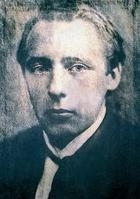Read works of He Liebo Melnikov at 诗海 | |||
Poet. Russia's main sponsor futuristic poetry, is also one of the schools of theorists. Formerly known as Victor • Vladimir Pavlovic. Affected by their parents, He Liebo Melnikov childhood on the natural and historical interest. Mathematics and Physics in 1908 entered St. Petersburg University, natural science lectures, and sweat between Sanskrit and the Slavic languages, but no wind. Most of the early poems the poet did not indicate the exact time of writing, he thought he started his own creation in 1905. First published poem was "the temptation of the sinner" (Искушение грешника, 1908), is already a mature futuristic works. Published in 1912, a futuristic collection, "a slap in the face to the community interest" in half of all He Liebo Melnikov's work, including the long poem "И and Э" (И и Э), "Blacksmith" (Кузнечик), etc. . Early in the folk literature of the poet to find topics and material, including language. He Liebo Kafelnikov in the ancient Slavic language based on the discovery and use to create the same root word to old words and new vocabulary words to expand Russian poetry. Experimental works of the famous "smile of the mantra" (Заклятие смехом ,1908-1909) throughout the poem by a "smile" word derived from both the ancient language word form, but also the modern Russian word form, as well as on coin new words. Covered with various types of derivative coat color at different times, reflect the poet's pursuit of "time jump" effect. "Time Skip" is He Liebo Melnikov important concept in aesthetics. He derived a mathematical calculation method of history, made a similar historical event will be repeated at regular intervals, he even wrote an article for this since the standard was "academic" and "teachers and students" (Учитель и ученик, 1912) .
Translated by Google
